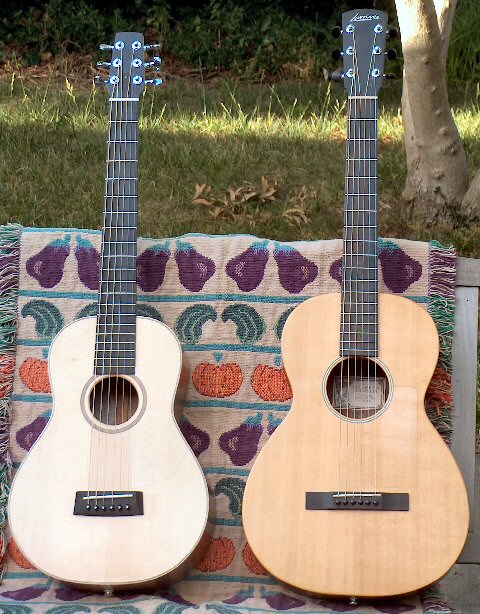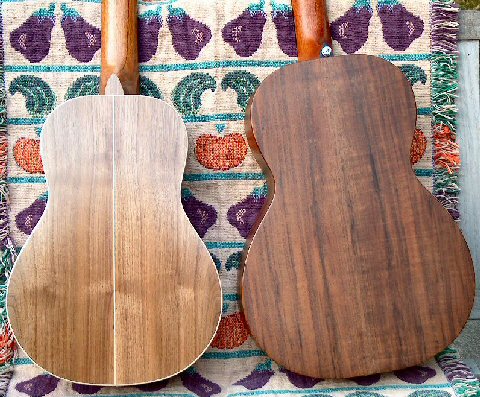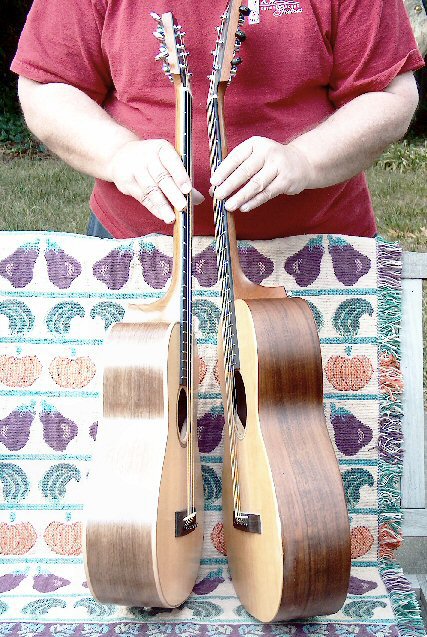For sheer acoustic guitar and recording fun, it’s hard to beat a visit to Doug Young‘s garage studio. Doug is a fantastic player, very knowledgeable recordist, and has some swell guitars sitting around his great sounding studio space. As an aside, he has done all us acoustic guitar players a huge favor by compiling a great set of pickup samples on his web site. His CD is definitely worth adding to your collection, and his articles in Acoustic Guitar Magazine are always good reading as well.
But for this occasion, I went to take advantage of his extremely cool Sound Devices 744 digital recorder. This is a top of the line system, used widely for major motion pictures or any other situation where great sonics, ruggedness, and portability are needed. I came for a shootout between his “king of the hill” unit and my much more modest recorders, a Fostex FR2-LE and a Zoom H2. Once I arrived, Doug suggested that we add his Edirol R09 to the mix, so we had four field recorders to compare.
I brought along my Wingert Model E tuned to G Wahine (D G D F# B D), a great old slack key tuning. Doug kindly hooked up his Schoeps CMC 6 mic bodies with his MK41 supercardioid capsules, one into his Sound Devices, and one into the Fostex. Then we rigged the Zoom and Edirol on stands to bring them close to the same position. Here’s what the setup looked like:
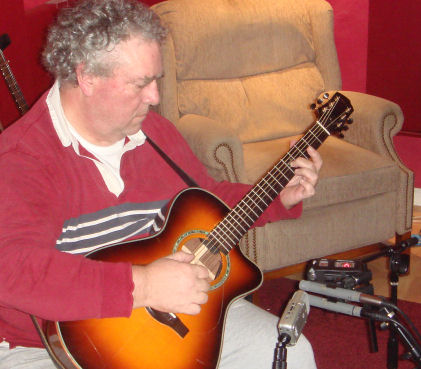
and here’s a shot from over the mics and recorders:
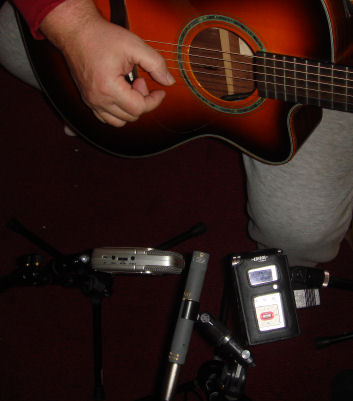
The Schoeps are directly over one another, so the bottom one disappears in this overhead shot.
In some rooms, this setup might not be tight enough to give an accurate comparison, but Doug’s studio is very well treated with broad band absorbers, so the sound is clean and even in most locations. Doug’s room is also extremely quiet, so we got some nice long “tails” as the last note of the clip died away. This will give you a chance to compare the internal noise levels of the different recording chains. One embarrassing caveat – we left the Edirol R09 in MP3 mode instead of 44.1 wave, so that little guy may be suffering some quality degradation. We didn’t realize our error until we’d used up all our time for the evening. Apologies to Edirol and R09 fans.
After the recording session, I brought the clips into my Adobe Audition 3.0 where I trimmed them as accurately as I could to the same starting point and length. (Once again I forgot to “clap” the start of each clip to get a synchronization point – the learning never ends.) I converted the H2 and R09 clips to mono by using the louder of their two tracks. Then I used AA3’s group normalize feature to bring them to the same average loudness. Loudness differences have a tremendous impact on the listener’s sonic evaluation, so I wanted to level the playing field in that aspect. I think average perceived loudness is more useful than peak normalization in this situation, and after processing I listened to the samples on my Dynaudio BM 6 monitors and thought their levels were extremely close.
Now for the samples. Just for fun I’ll post them blind, so you can download them and compare without prejudging. These are .wav files and fairly large, but we wanted to preserve the fidelity so you can make a better comparison.
Sample 1
Sample 2
Sample 3
Sample 4
Now after giving a good listen to these clips, you can see the key here and evaluate the results. I hope you find these comparisons useful, and that you’ll leave a comment or send an email sharing your impressions.
As always thanks a ton to Doug for being so generous with his time, space, and gear.



